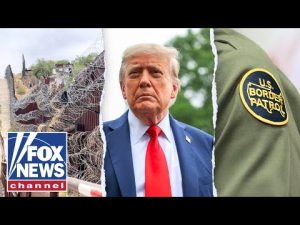In a move that has captured attention across the business world, President Donald Trump has made it clear that he intends to play a pivotal role in the future of artificial intelligence chips, specifically those produced by Nvidia. On a recent Sunday, Trump stated he would not allow Nvidia’s most advanced semiconductors, particularly the cutting-edge Blackwell AI chips, to be sold to China. However, he opened the door for other types of deals between Nvidia and Beijing, showcasing his intricate balancing act in international trade.
The backdrop to this announcement began during a CBS “60 Minutes” interview, where Trump was questioned about China’s growing hunger for high-performance semiconductors. With a firm tone, the president laid down the law, asserting, “No, we won’t do that,” when asked if he would permit the sale of the most advanced chips to the Chinese market. Not one to slam the door completely, Trump did note that Nvidia could still engage in discussions with China, as they are the “prime company in the world” for AI chips. It appears he is positioning the U.S. as a kind of referee in these discussions—ensuring American interests remain intact while still allowing some level of engagement with China.
This all comes on the heels of the Asia-Pacific Economic Cooperation Summit, where the conversation about tech exports was alive and buzzing. After his meeting with Chinese President Xi Jinping, Trump mentioned that while there hadn’t been direct talks about the Blackwell chips, there was a broader discussion around chips generally. Nvidia’s CEO, Jensen Huang, was also present and expressed hope that entering the Chinese market could be a win-win situation for both countries. Now, that’s quite the diplomatic juggling act!
As a result of this news, Nvidia’s stock saw a bump, rising by 1.4% in pre-market trading. This spike in shares is the kind of news investors love to hear, especially as Nvidia recently marked a historic milestone by becoming the first company ever to surpass a $5 trillion market cap! Talk about a success story! Investors are clearly optimistic about the potential for Nvidia to expand globally, even if the most advanced chips have to stay at home for now.
The details of these discussions reflect the complex dynamics of U.S.-China relations in the tech sector. While Trump has his eyes firmly set on safeguarding American technology from falling into the hands of rivals, he seems to recognize the potential benefits of fostering some level of collaboration. In the world of business, where competition drives innovation, it will be intriguing to see how these negotiations unfold—not just for Nvidia, but for the landscape of AI and technology as a whole. Expect further moves from both sides, as everyone plays their cards in this high-stakes game. Who knew the world of semiconductors could be so thrilling?







